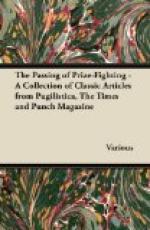But you see the necessity of appearing otherwise.—Hunger may be said to be a moral Mechi, which invents a strop upon which the bluntest wits are sharpened to admiration. Believe me, by industry and perseverance—which necessity will inevitably superinduce—the most dreary dullard that ever carried timber between his shoulders in the shape of a head, may speedily convert himself into a seeming Sheridan—a substitutional Sydney Smith—a second Sam Rogers, without the drawback of having written Jacqueline.
Take it for granted that no professed diner-out ever possessed a particle of native wit. His stock-in-trade, like that of Field-lane chapmen, is all plunder. Not a joke issues from his mouth, but has shaken sides long since quiescent. Whoso would be a diner-out must do likewise.
The real diner-out is he whose card-rack or mantelpiece (I was going to say groans, but) laughingly rejoices in respectful well-worded invitations to luxuriously-appointed tables. I count not him, hapless wretch! as one who, singling out “a friend,” drops in just at pudding-time, and ravens horrible remnants of last Tuesday’s joint, cognizant of curses in the throat of his host, and of intensest sable on the brows of his hostess. No struggle there, on the part of the children, “to share the good man’s knee;” but protruded eyes, round as spectacles, and almost as large, fixed alternately upon his flushed face and that absorbing epigastrium which is making their miserable flesh-pot to wane most wretchedly.
To be jocose is not the sole requisite of him who would fain be a universal diner-out. Lively with the light—airy with the sparkling—brilliant with the blithe, he must also be grave with the serious—heavy with the profound—solemn with the stupid. He must be able to snivel with the sentimental—to condole with the afflicted—to prove with the practical—to be a theorist with the speculative.
To be jocose is his most valuable acquisition. As there is a tradition that birds may be caught by sprinkling salt upon their tails, so the best and the most numerous dinners are secured by a judicious management of Attic salt.
I fear me that the works of Josephus, and of his imitators—of that Joseph and his brethren, I mean, whom a friend of mine calls “The Miller and his men”—I fear me, I say, that these are well-nigh exhausted. Yet I have known very ancient jokes turned with advantage, so as to look almost equal to new. But this requires long practice, ere the final skill be attained.
Etherege, Sedley, Wycherley, and Vanbrugh are very little read, and were pretty fellows in their day; I think they may be safely consulted, and rendered available. But, have a care. Be sure you mingle some of your own dulness with their brighter matter, or you will overshoot the mark. You will be too witty—a fatal error. True wits eat no dinners, save of their own providing; and, depend upon it, it is not their wit that will now-a-days get them their dinner. True wits are feared, not fed.




